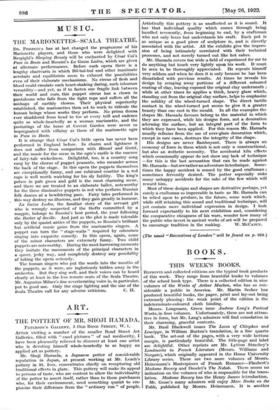MI SI C.
THE MARIONETTES—SCALA THEATRE.
Da. PODRECCA has at last changed the programme of his Marionette players, and those who were -delighted with Respighi's Sleeping Beauty will be enchanted by Cesar Cui's Puss in Boots and Rossini's La Garza Ladra, which are given at alternate performances. Before each opera there is a lengthy charivaria in which Bil-bal-bul and other inanimate acrobats and equilibrists seem to exhaust the possibilities even of their elaborate mechanisms. No circus of flesh and blood could emulate such heart-shaking daring, such inhuman versatility—and yet, as if to fasten one fragile link between their world and ours, this puppet circus has a clown in pantaloons who falls from the tight rope and suffers all the mishaps of earthly clowns. Their physical superiority established, the marionettes then set to work to ridicule the human beings whose works they perform. No prima donna ever shuddered from head to toe at every trill and cadence quite so whole-heartedly as a woman marionette, and the posturings of the basso at Covent Garden were never so impregnated with villainy as those of the marionette ogre in Puss in Boots.
It is strange that Cesar Cui's little opera has never been performed in England before. In charm and lightness it does not suffer from comparison with Hansel and Gretel, and the music for the scene in the ogre's castle is the essence of fairy-tale wickedness. Delightful, too, is a country song sung by the chorus of puppet peasants, who meander across the back of the stage. In this opera the puppets themselves are exceptionally funny, and one rubicund courtier in a red cape is well worth watching for his sly futility. The king's palace in pale green and gold is the most charming scene, and there we are treated to an elaborate ballet, noteworthy for the three diminutive puppets in red who perform Russian folk dances at a bewildering pace. Fairy tales performed in this way destroy no illusions, and they gain greatly in humour.
La Garza Ladra, the familiar story of the servant girl who is wrongly suspected of the thefts committed by a magpie, belongs to Rossini's best period, the year following the Barber of Seville. And just as the plot is made tolerable only by the quaint antics of the puppets, so Rossini's brilliant but artificial music gains from the marionette singers. A puppet can turn the " stage-waits " required by coloratura singing into exquisite comedy. In this opera, again, some of the minor characters are extremely funny. Two child puppets are noteworthy. During the most harrowing moments they imitate the movements of the principal characters in a queer, jerky way, and completely destroy any possibility of taking the opera seriously.
The human singers who put the words into the mouths of the puppets, as it were, arc ingloriously hidden away in the orchestra. But they sing well, and their voices can be heard clearly at least in the less remote seats of the Scala Theatre. Mr. Augustus Milner's fine reverberating voice is, in particular, put to good use. Only the stage lighting and the size of the Scala Theatre call for any adverse criticism. C. H.










































 Previous page
Previous page